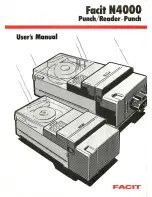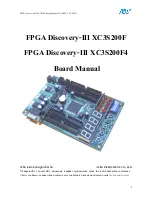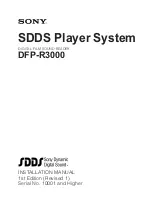
User's Guide HDSPe AES
© RME
29
18.2 Clock Modes - Synchronisation
AutoSync
The HDSPe AES has been equipped with
AutoSync
, an automatic clock source selection,
which adopts the first available input with a valid digital signal as the clock reference input. The
input currently used as sync reference is shown in the
AutoSync Ref
status field, together with
its current sample frequency.
AutoSync guarantees that normal record and record-while-play will always work correctly. In
certain cases however,
AutoSync may cause feedback in the digital carrier, so synchronization
breaks down. To remedy this, switch the HDSP’s clock mode over to 'Master'.
Via
Pref. Sync Ref
(preferred synchronization reference) a preferred input can be defined. As
long as the card sees a valid signal there, this input will be designated as the sync source, oth-
erwise the other inputs will be scanned in turn. If none of the inputs are receiving a valid signal,
the card automatically switches clock mode to ‘Master’.
Thanks to its AutoSync technique and lightning fast PLL, the HDSP is not only capable of han-
dling standard frequencies, but also any sample rate between 28 and 200 kHz. Even the word
clock input, which most users will use in varispeed operation, allows any frequency between 28
kHz and 200 kHz.
The HDSPe AES outstanding clock control allows for a synchronization of the output signal to
the word clock's input signal not only at identical sample rates, but also at half, quarter, double
and quad sample rates. A playback of 192 kHz can easily be synchronized via a 48 kHz word
clock signal.
SyncCheck
If several digital devices are to be used simultaneously in a system, they not only have to oper-
ate with the same sample frequency but also be synchronous with each other. This is why digi-
tal systems always need a single device defined as ‘master’, which sends the same clock signal
to all the other (‘slave’) devices.
Remember that a digital system can only have one master! If the HDSPe AES clock mode
is set to Master, all other devices must be set to Slave.
RME’s exclusive
SyncCheck
technology (first implemented in the Hammerfall) enables an easy
to use check and display of the current clock status. The SyncCheck field indicates whether no
signal (No Lock), a valid signal (Lock) or a valid
and
synchronous signal (Sync) is present at
each of the digital clock source inputs. The ‘AutoSync Ref’ display shows the current sync
source and the measured frequency.
In practice, SyncCheck provides the user with an easy way of checking whether all digital de-
vices connected to the system are properly configured. With SyncCheck, finally anyone can
master this common source of error, previously one of the most complex issues in the digital
studio world.
Summary of Contents for Hammerfall HDSPe AES
Page 5: ...User s Guide HDSPe AES RME 5 User s Guide HDSPe AES General...
Page 11: ...User s Guide HDSPe AES RME 11 User s Guide HDSPe AES Driver Installation and Operation Windows...
Page 33: ...User s Guide HDSPe AES RME 33 User s Guide HDSPe AES Connections and TotalMix...
Page 41: ...User s Guide HDSPe AES RME 41...
Page 63: ...User s Guide HDSPe AES RME 63 User s Guide HDSPe AES Technical Reference...
















































